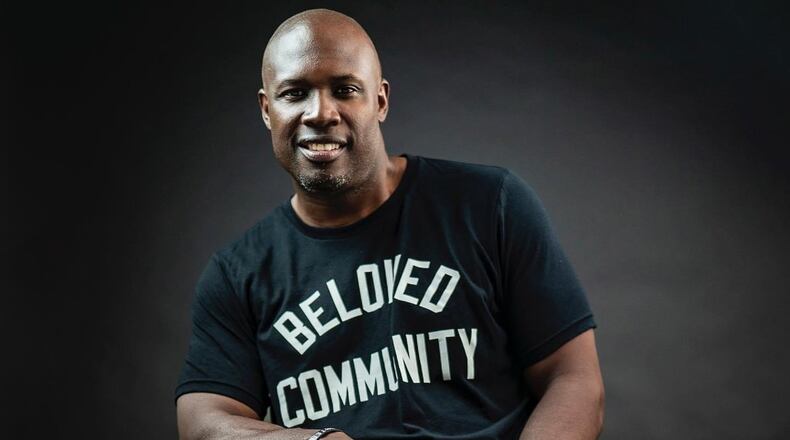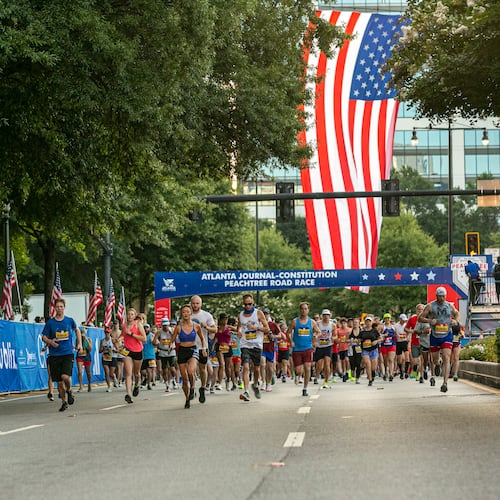For C.J. Stewart, co-founder of L.E.A.D., running the virtual 2020 Atlanta Journal-Constitution Peachtree Road Race opened up more than his own horizons – it opened up a new path to positively influence the city’s black youth.
After the end of his career as an outfielder in the Chicago Cubs organization, the Atlanta native opened his own business as a hitting instructor, working with a roster of MLB rising stars. But Stewart, now 48, felt a pull to do something tangible to help Atlanta’s at-risk black young men succeed in a world stacked against them, so in 2017 he and his wife, Kelli, started the non-profit L.E.A.D. (Launch, Expose, Advise and Direct) program, using baseball as a tool toward empowerment.
The program has since expanded, with a youth tennis program for girls. In 2020, Stewart and several of his L.E.A.D. mentees, called ambassadors, ran the Peachtree for the first time, and a tradition was born.
Credit: Courtesy of C.J. Stewart
Credit: Courtesy of C.J. Stewart
Q: Had you been a runner before 2020?
A: No. I was born and raised in Northwest Atlanta; it was poverty then, it’s poverty now. Black people in my community didn’t have time to be jogging or running. That is a very privileged thing to do. Junior or senior year at Westlake High School, my homeroom teacher was the cross country coach and I liked her so I said yes when she asked if I’d join the team. But I was like, “I can’t get caught out here; it would have been a signal to my peers that I’m trying to act white.”
Q: Growing up, had you heard of the Peachtree?
A: As a child? Never. I’m not speaking on behalf of all black people, but this is my thought: If you’re a middle- or upper middle-class black American in Atlanta, of course you hear about the Peachtree Road Race and everything else that’s an Atlanta tradition. But if you’re black and poor in Atlanta, you don’t know anything about it.
Q: Why did you start running?
A: Because of the killing of Ahmaud Arbery. It started out as a tribute, and then became a way to avoid depression. Ahmaud was struggling with mental health issues and one of the things he did to regulate that was to run. My mental health was deteriorating because I didn’t know what was going on in the world, and it just kept improving the more I kept running. But I also wanted to show that these streets belong to black runners, too.
Q: How did the idea come about for L.E.A.D to do the Peachtree?
A: I remember going to Rich Kenah [CEO of Atlanta Track Club] through Mary Ford, a mutual friend. We were at a Leadership Atlanta retreat and she had on these really cool Atlanta Track Club running shoes. I had thought the Club was similar to The Masters, where it was a special pass that was willed to the next generation of the family. I thought, “I don’t even want to know what it costs to be in the Track Club and run the Peachtree.” When they told me how little it cost, I was like, “Man, I can do that.” That’s one of the reasons I want to tell my story, to help Atlanta Track Club to create opportunities for other people to have barriers removed.
Q: What have your L.E.A.D. ambassadors learned from doing the race?
A: The boys come in with a level of confidence that “Oh, this is going to be easy.” Then – though they definitely finish before me – they acknowledge that it required training. I love that because it really is symbolic of being black boys in Atlanta living at or below the poverty level, learning that talent isn’t enough. You have to have the work ethic to develop the habits you need to win at the game of life. Finishing the Peachtree gives them a sense of achievement and makes them more open to doing new things. They also get that coveted shirt, which is a shared thing, a marker that you’re respected.
Q: And what about you?
A: I’ve been doing rehab for osteoarthritis, but I’ll be out there even if I have to walk. I’ve been collecting my shirts. This will be my fifth one, but I think about getting one 10 years from now, 20 years. For the rest of my life, I want to be running.
Read more of our People of Peachtree series and find all of our race-related stories at ajc.com/peachtree.
About the Author
Keep Reading
The Latest
Featured


